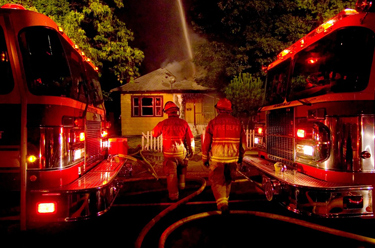Drivers in California who cause crashes may find their pocketbooks dented as well, courtesy of local fire departments.

More than two dozen fire agencies in the Sacramento region have begun tallying service charges at crash sites and sending bills to drivers who cause crashes or their insurance companies. (Brian Baer / Sacramento Bee Staff Photo)
More than two dozen fire agencies, struggling for ways to boost sagging budgets, have begun tallying service charges at crash sites and sending bills to drivers or their insurance companies.
Is a pumper truck called to the scene? That'll be $400. Traffic cones and flares needed? Another $20. An incident commander to oversee? That's $75 an hour.
Roseville, Woodland and at least a half dozen smaller Sacramento area fire districts have imposed such fees in the past year. The city of Sacramento expects to start this fall. And, beginning July 1, Placer County Fire will charge non-local drivers or their insurance companies for crashes that require fire agency response.
Critics, mainly insurance companies and tax activists, call the fees a new tax and say the practice will backfire by causing insurance companies to raise rates.
But Rui Cunha, Placer County emergency services manager, said such fees allow the county to recoup costs from out-of-towners who don't pay taxes to support the agency. The county's firefighters respond to hundreds of crashes a year, he said, including on Interstate 80, that involve drivers from outside the area.
Placer's fees, similar to those imposed by other agencies, will run a few hundred dollars for a simple crash involving gas or oil cleanup, but could add up to several thousand dollars if extrication tools are needed and helicopters are called.
The fees are "a difficult move for fire departments," Cunha said. "Firefighters in general just want to help people. Unfortunately, you can't help people unless you're funded."
Fire departments or their billing agencies often send the bill directly to the driver's insurance company, but sometimes bills wind up going to drivers themselves. Fire officials may determine who is at fault from police reports, or they may simply send a notice to the driver they think is at fault, and let the insurance companies sort it out.
Emergency services fees are not entirely new. State vehicle and health codes have long allowed local governments to recover reasonable costs for some services. Elk Grove's former fire district made unwanted headlines a decade ago when it charged a Stockton widow $400 for an Interstate 5 crash that killed her husband.
But few fire districts had imposed such fees until the past two years, when the collapse of property and sales taxes slashed their budgets.
In the city of Sacramento, where two fire stations are slated for part-time closures, officials are hurrying to put a fee in place. They estimate the fee - expected to be applied to non-residents - could bring in more than $1 million a year.
"It has been tried and true in a lot of other cities," Assistant City Manager Cassandra Jennings said. "We think it is time the city get on board."
The $1 million in hoped-for revenues already has been used to balance the city's budget for the fiscal year that begins July 1, Jennings said, even though the council has not yet voted on a formal proposal.
Judging from results in other localities, Sacramento's expectations for financial gain might be overly optimistic.
Woodland, which bills insurance companies for both city residents and non-residents, took in $50,000 in its first year, far below the projected $160,000. Woodland recovered an average of $379 per incident.
Woodland Fire Chief Tod Reddish said fire officials sent out fewer bills than expected, choosing not to charge drivers in lesser crashes, and not to go after drivers when insurance companies refused to pay.
Roseville reports it collected $30,000 in its first year. Placer officials project they will make $120,000. In each case, it's a small amount compared to the agency's overall budget.
One of the state's most aggressive fee proponents is a Roseville-based company that has turned them into a business niche. Fire Recovery USA does the billings on cost-recovery fees for more than 150 client cities and fire agencies in 20 states, including Woodland and Placer. The company takes a cut of up to 20 percent of recovered revenues.
The company's chief financial officer, Rick Benner, former president of the Sacramento Kings, calls cost-recovery fees a legitimate response when traditional revenue sources no longer support adequate service levels.
"One option is to reduce services," Benner said. "The other is to raise taxes, and (governments) are not in a position to do that. The third option is to (make) the people responsible for the accidents pay a portion of the cost."
Sam Sorich, president of the Association of California Insurance Companies, calls the fees an unfair added tax for a basic service, and said some drivers may find themselves on the hook if their insurance companies refuse to pay. Insurance companies point out another irony: If you are an uninsured driver, fire districts generally won't bill you, figuring you don't have the money to pay.
Sorich said the state Legislature should step in, "if not to ban the fees, at least to set some standards for them."
A bill briefly surfaced in the Legislature last year to regulate the fees. But its author, Assemblyman Anthony Portantino, D-La Cañada Flintridge, put the idea on hold.
Some fire officials whose cities impose the fee say they have mixed feelings.
"If we weren't in the financial situation we're in, I wouldn't even consider this," said Woodland's Reddish. "Philosophically, we are about providing service, not about generating money."











